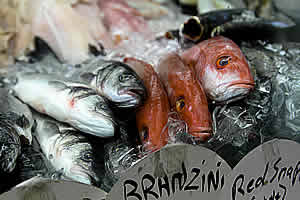
The study found "if the fish is sustainable, then it is likely to be healthy to eat too." Photo by: J. Warren/Gelfond Fund for Mercury Research
When ordering seafood, the options are many and so are some of the things you might consider in what you order. Is your fish healthy? Is it safe? Is it harvested responsibly?
While there are many services and rankings offered to help you decide â€" there's even an iPhone app â€" a group of researchers have found a simple rule of thumb applies.
"If the fish is sustainable, then it is likely to be healthy to eat too," said Leah Gerber, an associate professor and senior sustainability scientist at Arizona State University.
Gerber and colleagues ran an analysis of existing literature on fish to see which choices are consistently healthier and which are high in mercury or overfished. Their findings are published in today's early online version of the Frontiers in Ecology and the Environment, a publication of the Ecological Society of America.
In "Sustaining seafood for public health," Gerber and fellow authors â€" Roxanne Karimi, Stony Brook University, Stony Brook, N.Y., and Timothy Fitzgerald of the Environmental Defense Fund, Washington, D.C. â€" state that their analysis is the first to bring together several types of sustainability rankings, along with species specific health metrics, including omega-3 fatty acid and mercury content.
"In general, larger longer-lived fish are more likely to have exposure to toxins due to the length of their lives and their place on the food chain," Gerber explained. "So you might be best served to stay away from them â€" like Bluefin Tuna or Sturgeon. Besides, these stocks have been depleted by fishing."
Safer choices might be Alaskan Pollock or Atlantic Mackerel, said Gerber, a conservation biologist and sushi lover. In fact, the research grew out of her interest in knowing more about the fish she was eating and the choices she and her friends made when dining on fish.
In one experience, Gerber said, friends ordered Bluefin Tuna to her dismay.
"That my socially- and health-conscious friends did not know Bluefin was taboo made me think about how complicated it has become to decide what seafood to eat," she recalled. "How do seafood consumers make informed decisions based on ecological risk, health risks (mercury) and health benefits (omegas)?"
So Gerber, Karimi and Fitzgerald began digging in the literature and developed a database on both ecological and health metrics of seafood.
"We used the database to look for patterns of similarity between ecological and health metrics, and found that in general, choosing healthy seafood also means that you are choosing sustainable seafood," Gerber said. "Great news for sushi-lovers! Choose the sustainable options and you also are boosting omega-3 intake, without risking mercury poisoning."
Next up for Gerber is to help develop a tool that can be used to guide seafood consumers to smarter choices in what they eat.
"We want to help people choose fish that are both eco-friendly and healthy," she said.
